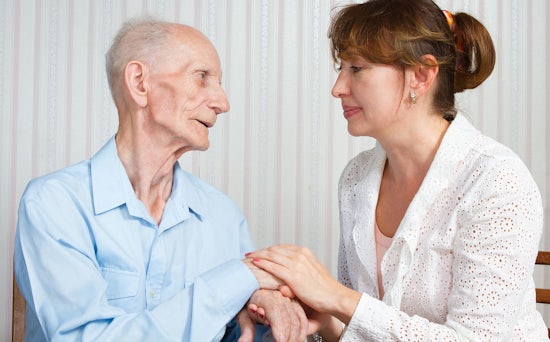How to start the conversation about dementia
Noticing a loved one’s cognitive decline can be upsetting and many find starting the conversation about it extremely emotional and uncomfortable. However, it is really important they are encouraged to see their GP
who can refer them for assessment to find out for certain the cause of
the problems.

Starting the conversation about dementia can be extremely emotional and uncomfortable (Source: Shutterstock)
There isn’t a ‘one size fits all’ approach to discussing a person’s cognitive decline. Everyone is different and deals with these types of issues in their own way. The following information may help you when thinking about discussing your concerns with a loved one.
Before the conversation
To help prepare yourself, it does help to think about some aspects before you have a conversation:
- Note situations that have you worried so you’re able to express yourself clearly in the conversation.
- Are you the right person to be having this conversation with this person? Some people find it easier to have these types of conversations with other people such as a different relative, close friend, religious figure or health worker.
- What approach previously helped persuade them to do something they were unsure about?

- Think about what your loved one may feel – they may be frightened or be despondent and think there no point in seeking further help.
Plan when to have the conversation
- Plan a conversation in a familiar, non-threatening environment.
- Choose a time when you are both relaxed.
- If your loved one has noticed any memory loss themselves, they may initiate it themselves.
What to say
- You could start by asking if they’ve noticed any changes in themselves or if they’ve been feeling different.
- Explain you are raising concerns because you care about them and want to offer support.
- There is a lot of stigma about dementia so try to be positive and reassuring and use non-judgemental language.
- Instead of saying ‘last week you couldn’t do this’ say something similar to ‘you seemed to find it hard to do this last week’.
- It is important to point out that the memory loss may not be dementia so it is important they see their GP as soon as possible.
- Be prepared for the person to be upset, angry or behave in an unexpected way. Listen to how they respond, as you may need to adapt your approach.
Feedback from carers of people with dementia have pointed out while there are some who will be extremely uncomfortable discussing the subject, many other people living with dementia are relieved someone else has noticed they were having problems with their memory and they want help.
It is important they feel they are in control of their care plans, rather than their condition being talked about behind their back, and decisions being made without their involvement.











![The new Aged Care Act exposure draft is slated for release in December of 2023, but advocates hope to see it rolled out on January 1, 2024. [Source: Shutterstock]](https://agedcareguide-assets.imgix.net/news/articles/wp/agedcareact__0811.jpg?fm=pjpg&w=520&format=auto&q=65)












Comments